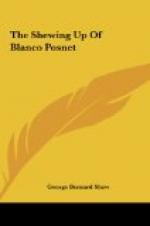Maeterlinck’s Monna Vanna and Mr. Granville
Barker’s Waste may or may not be great poems,
or edifying sermons, or important documents, or charming
romances: our tribal citizens know nothing about
that and do not want to know anything: all that
they do know is that incest, prostitution, abortion,
contagious diseases, and nudity are improper, and
that all conversations, or books, or plays in which
they are discussed are improper conversations, improper
books, improper plays, and should not be allowed.
The Censor may prohibit all such plays with complete
certainty that there will be a chorus of “Quite
right too” sufficient to drown the protests
of the few who know better. The Achilles heel
of the censorship is therefore not the fine plays
it has suppressed, but the abominable plays it has
licensed: plays which the Committee itself had
to turn the public out of the room and close the doors
before it could discuss, and which I myself have found
it impossible to expose in the press because no editor
of a paper or magazine intended for general family
reading could admit into his columns the baldest narration
of the stories which the Censor has not only tolerated
but expressly certified as fitting for presentation
on the stage. When the Committee ruled out this
part of the case it shook the confidence of the authors
in its impartiality and its seriousness. Of course
it was not able to enforce its ruling thoroughly.
Plays which were merely lightminded and irresponsible
in their viciousness were repeatedly mentioned by
Mr Harcourt and others. But the really detestable
plays, which would have damned the censorship beyond
all apology or salvation, were never referred to; and
the moment Mr Harcourt or anyone else made the Committee
uncomfortable by a move in their direction, the ruling
was appealed to at once, and the censorship saved.
A COMIC INTERLUDE
It was part of this nervous dislike of the unpleasant
part of its business that led to the comic incident
of the Committee’s sudden discovery that I had
insulted it, and its suspension of its investigation
for the purpose of elaborately insulting me back again.
Comic to the lookers-on, that is; for the majority
of the Committee made no attempt to conceal the fact
that they were wildly angry with me; and I, though
my public experience and skill in acting enabled me
to maintain an appearance of imperturbable good-humor,
was equally furious. The friction began as follows.
The precedents for the conduct of the Committee were
to be found in the proceedings of the Committee of
1892. That Committee, no doubt recognizing the
absurdity of calling on distinguished artists to give
their views before it, and then refusing to allow
them to state their views except in nervous replies
to such questions as it might suit members to put
to them, allowed Sir Henry Irving and Sir John Hare
to prepare and read written statements, and formally




